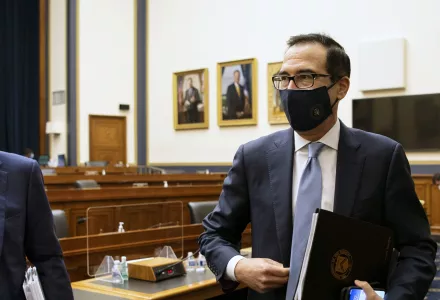Article

Our weekly COVID-19 and Economic Diplomacy tracker looks at policies that impact the coordination of international governments and central banks, ongoing commentary and analysis, and asks what these turbulent times mean for economic diplomacy.
We’d love to hear what you think. Send us your comments, and be sure to follow us on Twitter @BelferEDI.
The Highlights
- Global worker income fell more than 10% equating to a loss of $3.5 trillion and accounting for 5.5% of global GDP.
- Economists warn that the U.S. is repeating the mistakes of the 2008 recession. Lack of a stimulus package is partially due to the fact that the economy has not slowed as sharply as expected.
- The ECB urged the EU to make the recovery fund permanent. It will be a net benefit to Croatia, Bulgaria, Greece, Portugal, Spain, and Italy. The “frugal four” and Germany will lose nearly 2% of pre-pandemic GDP.
- In an unexpected move, Turkey's central bank raised its benchmark interest rate by 2 percentage points to boost the lira.
Global Developments
- Income earned by workers globally fell more than 10% in the first nine months of 2020 due to the pandemic. This equates to a loss of more than $3.5 trillion and accounts for 5.5% of global GDP. During the second quarter, the number of working hours fell 17.3% compared to pre-pandemic levels, equivalent to a loss of almost half a billion full-time jobs.
U.S. Developments
- Economists warn that the U.S. may repeat the mistakes following the 2008 recession as economic recovery slows. The moderate economic rebound, lack of government stimulus package, and premature pullback in government support will likely risk economic recovery. One factor making a Congressional stimulus deal unlikely is the economy is indeed slowing but not as sharply as economists expected.
- Treasury Secretary Steven Mnuchin and Federal Reserve Chair Jerome Powell testified before Congress projecting optimism regarding U.S. economic recovery. Both officials credited fiscal support, including one-time stimulus checks and increased unemployment insurance (which expired in July). However, both Mnuchin and Powell warned that without additional Congressional support, “we don’t really know what will happen…[but the] path ahead continues to be highly uncertain.” During the hearing, Powell faced criticism from lawmakers over the Fed’s corporate bond buying program.
European Developments
- The European Central Bank has called for the EU to consider making the pandemic recovery fund permanent. The €390 billion grant is a key element of the recovery fund and will benefit Croatia, Bulgaria, and Greece economically. The fund will also provide net benefits to Portugal, Spain, and Italy while the “frugal four” countries of Austria, Denmark, Sweden, and the Netherlands in addition to Germany will lose nearly 2% of pre-pandemic GDP.
- Eurozone services activity fell from 50.5 to 47.6, marking the first time in three months that the index fell below 50, and the lowest level since May. An index below 50 indicates the majority of businesses experienced a contraction in activity. Manufacturing activity, however, has continued to improve with manufacturing PMI at 53.7, the highest in two years. Given that services are the eurozone’s dominant sector, the data illustrates that “the recovery is grinding to a halt.”
- The UK has announced new restrictions to curb the increase in COVID-19 cases but scientists warn that more strict regulations are needed. Prime Minister Johnson announced that pubs and hospitality outlets are subject to a 10pm curfew and increased the fine amount for social gatherings larger than six people. However, experts argue that the measures are not enough, and the UK should return to restrictions imposed during the summer of 2-meter social distancing, immediate closure of all indoor bars and restaurants, and reducing the size of permitted gatherings. The government's chief scientific adviser warned that the number of new daily cases could rise to 49,000 by mid-October if the pace of the spread continued.
Emerging Markets
- The virus is prompting a rethink of urban planning in developing economies. More than half of the world’s developing economies live in cities and at least 90% of COVID-19 cases have been in urban areas. Studies show that local conditions within cities appear to be more significant in contributing to the spread of the virus.
- In an unexpected move, Turkey’s central bank lifted its benchmark interest rate by 2 percentage points in order to boost the lira. The move reverses President Erdogan’s earlier push for lower rates despite economists and investors urging the bank to raise rates to slow credit growth pace and stave off a currency crisis. Compared to the beginning of the year, the lira has fallen more than 20% against the dollar and inflation is at 11.7% as of last month.
Odds & Ends
- Adam Tooze writes in Foreign Policy on how COVID-19 immunization is both solving and triggering larger problems.
- Swee Kheng Khor and David Heymann write for Foreign Affairs on what SARS taught Asian governments about fighting infectious diseases.
- Ezekiel Emanuel and Risa Lavizzo-Mourey recommend in The Atlantic five ways the healthcare system can stop amplifying racism.
- Timothy Bartik writes for Brookings on how to help distressed communities in the U.S. recover from the pandemic induced recession and achieve long-term prosperity.
- Ashish Jha argues in Foreign Affairs that federalism has both saved and doomed the U.S.
- The Economist reports that the number of extremely poor people will rise by 70 million - 100 million this year and reverse almost a decade of progress. It has a deeper dive on how the pandemic is plunging millions back into extreme poverty.
Recommended citation
Suh, Hannah. “This Week in COVID-19 and Economic Diplomacy: ‘Global Worker Income Fell By 10%’.” September 25, 2020


